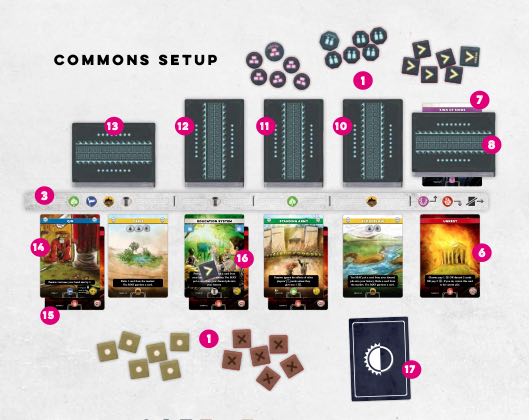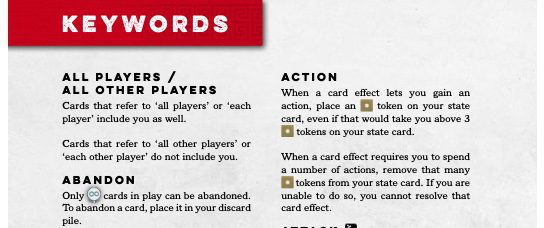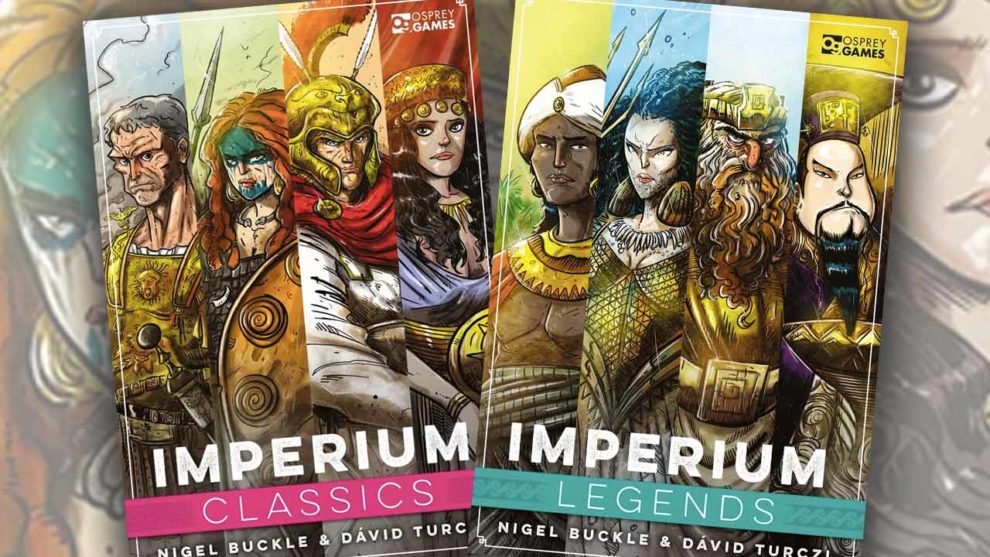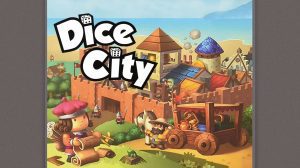Imperium: Classics (and its sibling Imperium: Legends) are deck-building civilization-building games with highly asymmetric factions. Read on to see if Imperium constructs a mighty empire, or becomes lost to the annals of time in our review of the Imperium series.
(Note: Imperium: Classics and Imperium: Legends are two versions of the same game, but each with different sets of factions. I will henceforth refer to both collectively as Imperium unless otherwise specified.)
Imperium is a combination deck-building, civilization-building game coming from the design combo of Nigel Buckle and David Turczi. If the name David Turczi sounds familiar to you, it’s because he’s well-known for both his complex Euro games like Anachrony, his work on the “T” series (Tekhenu, Tawantinsuyu, etc.) as well as his prolific work in designing solo modes for dozens of other games like Kanban EV, So You’ve Been Eaten, Mosaic: A Story of Civilization, Tiletum and many more.
Although my excitement was high for a seemingly oddball combo of a civ game mixed with a deck-building game, I have to admit that based on Turczi’s design track record, I was more than a little trepidatious going into my first play of Imperium. Ultimately, my love for civilization games, deck-building, and player asymmetry overruled my concerns about complexity. Speaking of complexity, here’s a very brief overview of gameplay.
How to Imperium…Imperiate??
Each player takes a different faction, either mostly historical in Imperium: Classics (Greeks, Romans, etc.) or the somewhat more mythical ones in Imperium: Legends (Arthurians, Atlanteans, etc.) Both of the Imperium games are fully compatible with each other using the same basic rules set, so the different player combinations are as bountiful as the grains in the sands of time. I have yet to play as or against every faction, so take this review with as much salt as you care to add.
The basic goal of Imperium is to score the most points, or alternatively have the least amount of Unrest cards when the Unrest deck runs out, if it runs out at all. Whether the Unrest deck runs out is entirely up to the players’ decisions throughout the game. More on Unrest in a bit. Points are generated by cards present in your hand, deck, play area, discard pile, and history. If this sounds complicated, it’s because it is.
On your turn you can do one of three actions: Activate, Innovate, or Revolt. If this sounds simple, I’ve got some bad news: it’s not.
Let’s take a quick detour here and talk about the heart of the game: the cards. Each player has a unique player deck, tailor-made to their specific faction. Within each player area there are five designated spots for faction-specific cards. Additionally, there is a card market area available to all players. Within this card market there are three different draw decks, one main deck that will refill the other three, as well as a Fame deck and a deck of Unrest cards. If the sheer amount of game elements I’m listing is starting to make your head spin, you’re not alone. There is a lot going on. I’m not going to go too much into detail about the common card market; suffice to say that you’ll have options.

Now, back to the gameplay actions. As with many deck-building card games, you’ll begin your turn with a hand of 5 cards, with which you can then choose to take one of the three aforementioned options:
Activate: Take up to 3 actions and use up to 5 “exhaust” abilities. The actions and “exhaust abilities” you have available to you are dictated by the cards in your hand or play area.
Innovate: Refrain from taking any card actions, discard your hand, and get a new card from the market, either from the three face-up cards or their respective face-down decks.
Revolt: Forgo either of the above to simply get rid of any Unrest cards in your hand, returning them to the Unrest deck.
Unrest cards represent the political instability of your civilization, but are essentially just negative cards that both clog your deck and give you negative points at the end of the game. You’ll get Unrest cards throughout the game, most often a result of acquiring new cards. After all, growing a civilization isn’t exactly a smooth endeavor.
After choosing and performing one of the options, the player then goes through a cleanup phase, which involves adding and removing some token types that I won’t get into for the sake of brevity, discarding any number of cards, and drawing back up to five cards.
Play continues until the end of the round (designated by a “solstice” token placed between the first player and the one to the left of them) upon which some end-of-round effects may take place depending on cards played. Rinse and repeat until one of the game-end triggers has been met. Generally this will be if either the main deck in the common market or one player’s “development deck” is empty. (I haven’t really dived into the Fame deck, but that contains its own comparable but unique game-end trigger.) Finish out that round, take one more final round, then total up all the scores. The player with the most points is the winner. Or, if your group was careless or ruthless enough to run out the Unrest deck, the game ends immediately and the player who has the least Unrest wins.
That’s the basic game structure of Imperium. If that seems pretty straightforward, then congratulations. You picked it up faster than I did. However, this basic system is merely the bones of what is a fully fleshed-out, highly complex tabletop ecosystem. Like many deck-building games, the complexity is in the cards themselves. Additionally, every faction plays extremely differently. If Imperium is an orchestra, players aren’t just playing different instruments. They’re playing different songs. While the roles and actions aren’t quite as asymmetric as a game like Root, Vast, or Merchant’s Cove, each faction plays entirely different in their motivations, playstyles, key focuses and general “feel.” How that variance manages to not end up in some discombobulated cacophony of a game experience floors me. Despite each player playing their songs in their own way, it all comes together in a satisfying crescendo as you step back and hear the full production.
Final Thoughts:
Imperium is a heavy game with a lot of moving parts. It is easily the most complex deck-builder that I have played. It’s even pretty complicated for a civilization game, on par with something like Through the Ages. I haven’t even mentioned the extremely robust solo mode, which comes with its own rulebook and further complications. I think it plays best at two.
But ultimately it comes down to the important question: did I enjoy the game? With such a complicated game comes a complicated answer. I think ultimately it’s a yes. I enjoyed what I was doing once I finally internalized the gameplay–no easy task since the rulebook is horrible, at least in terms of learning the game. It actually has a great reference guide of terms, keywords, even faction overviews and helpful strategy suggestions. It feels like there should have been two rulebooks: a learn-to-play and a rules reference (a la Fantasy Flight games), but all we got was the reference guide.

I can’t say that I really knew what I was doing in terms of strategy, but the familiar and enjoyable mechanics of building, slimming, and optimizing my deck kept me engaged. Granted I don’t generally play a lot of super complex games so the difficulty I had grokking strategy may not be a universal experience.
The combination of civilization and deck-building is an odd pairing. Is it a match made in heaven, like peanut butter and jelly? Well, not exactly. Think of it more like a curry: a sizable collection of ingredients that come together to form extremely complex flavors, each curry being unique to whatever specific ingredients you decide to mix in. Ultimately, it’s delicious, but I don’t always want that complex of a meal. On top of that I have almost no concept of how to properly cook one.
Overall, Imperium is not something that I’d want to play all the time; I don’t appreciate brain-burning perhaps as much as my fellow Meeple Mountain writers. Still, I can’t help but admire the design. When I do feel up to playing it, I know that I’ll enjoy it, provided I can remember what kind of board game curry I’m supposed to be eating.











Add Comment